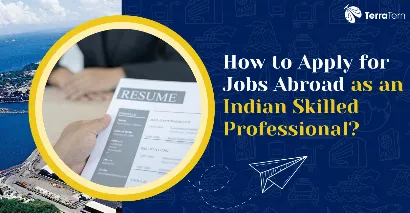Key Highlights
- Latest Facts and News:
- Understanding the Job Market Abroad
- How to Apply for Jobs Abroad: Step-by-Step Guide
- Online Job Search Strategies
- Preparing Your Resume for International Applications
- How to Apply for Jobs Abroad from India
- Visa Higher Success Requirements
- How to Apply for Jobs Abroad Online: Leveraging Digital Platforms
- Building Your Professional Network
- Remote Work and Digital Nomad Opportunities
- Preparing for Your International Career Move
- Cultural Adaptation and Interview Preparation
- Common Cultural Interview Mistakes to Avoid
- Tax Implications and Financial Planning
- Post-Arrival Integration and Career Development
- Conclusion
Many citizens might have questions about how to go abroad for a job, and many might dream of launching a career on the global stage. Discover the definitive guide to how to apply for jobs abroad, navigate through challenges, and secure your place in the international job market. With this step-by-step guide, understand the nuances of applying for jobs abroad from India and leverage digital tools for a seamless process.
Latest Facts and News:
-
The global job market is expected to grow by 3.5% in 2025, creating more opportunities for international job seekers.
-
Remote work trends have increased the availability of international job opportunities by 27% since 2023.
-
India ranks 3rd globally in outbound workforce mobility, with a 15% increase in professionals seeking jobs abroad in 2024.
-
The demand for multilingual professionals in international roles has surged by 40% in the past year.
-
New visa policies in countries like Canada and Australia have made it easier for skilled workers to apply for jobs abroad.
Understanding the Job Market Abroad
By the year 2025, the international job market will be more accessible and in demand than ever before. Seeking a place in the job market in other countries means undertaking thorough research on such a country's economic trends, skill gaps, and cultural needs.
Begin by interpreting labour market statistics that government agencies and market reports have compiled. Other countries, such as Canada, have witnessed international job postings reach 1 per cent in 202,4, and Australia's skilled migration opportunities. The United States still has the best opportunities for H-1B visa holders, with more than 780,000 applications in 2024.
Key Market Research Areas
-
Industry Demand Analysis: Find out which sectors are in demand for skills shortages.
-
Comparison of the Pay Packages: Comparison of salary benchmarking
-
Employment Laws: Get employee protection laws
-
Long-Term Career Chances Analysis: Be sure to have instruments of economic stability
The European markets are experiencing high demands for healthcare, engineering and IT talents, with Germany alone requiring 400,000 talents every year. The countries of the Gulf are still developing knowledge economies, and this opens up their opportunities in the fields of finance, healthcare, and clean energy.
Also Read: Top Nurses Vacancy Abroad: Latest Expert Job Guide
Top Countries for International Job Opportunities

When considering applying for jobs abroad, targeting countries with robust job markets, competitive salaries, and favourable visa conditions is key. Below is a list of popular countries for international job seekers, including their job market trends and visa requirements.
|
Country |
Job Market Trends |
Visa Requirements |
|
United States |
High demand in tech, healthcare, and finance. |
H1-B Visa for skilled professionals. |
|
Canada |
The strong job market in healthcare, tech, and engineering. |
Express Entry, work permits for skilled workers. |
|
Germany |
Leading demand in engineering, IT, and healthcare. |
EU Blue Card for skilled professionals. |
|
Australia |
Significant opportunities in healthcare, IT, and mining. |
Skilled Independent Visa for qualified workers. |
|
United Kingdom |
High demand in healthcare, IT, and engineering. |
Tier 2 Visa for skilled workers. |
|
Singapore |
Growing sectors in IT, healthcare, and finance. |
Employment Pass for foreign workers. |
|
United Arab Emirates |
The strong job market in construction, hospitality, and finance. |
A work Visa and an Emirates ID are required. |
In-Demand Skills for Global Careers
To excel globally and understand how to apply for jobs abroad, focus on acquiring many in-demand skills:
-
Digital Literacy: Key to applying for jobs abroad online.
-
Communication Skills: Crucial for professionals from India to learn how to apply for jobs abroad.
-
Technical Expertise: Essential for high-demand fields like IT and healthcare.
-
Cultural Adaptability: Vital for thriving in diverse global environments.
-
Language Skills: Boosts chances when exploring how to apply for jobs abroad.
How to Apply for Jobs Abroad: Step-by-Step Guide
Dreaming of an international career? Wondering how to get a job abroad? Follow these steps to understand how to apply for jobs abroad and make your application process seamless.
-
Research Opportunities: Use platforms like LinkedIn to explore how to apply for jobs abroad online.
-
Target Countries: Focus on destinations with high demand for your skills to master how to apply for jobs abroad from India.
-
Tailor Your Resume: Customize your CV to meet specific standards, showcasing your suitability for roles abroad.
-
Apply Online: Leverage job portals, company websites, and tools focused on how to apply for jobs abroad online.
-
Network Effectively: Join global forums and connect with recruiters to learn how to strategically apply for jobs abroad from India.
-
Prepare for Interviews: Research cultural norms and expectations to excel in international interviews.
-
Check Visa Requirements: Understand the work visa process, which is a critical step in knowing how to apply for jobs abroad.
-
Follow-Up: Consistently track applications and communicate with potential employers.
Following these step-by-step guides will help you better. Before jumping into anything, you should know about all your opportunities to work overseas, so you know what you are dealing with.
Online Job Search Strategies
The way to apply to work in a foreign country via the Internet has changed a lot, as in 2025, job matching powered by AI and remote-first job applications will be the norm in the labour market. Online job searching has become strategic, which means using the various platforms and maximizing digital exposure.
Top Performing International Job Platforms:
|
Platform |
Global Reach |
Success Rate |
Best For |
|
|
200+ countries |
67% |
Professional networking |
|
Indeed Worldwide |
60+ countries |
45% |
Volume applications |
|
Glassdoor |
190+ countries |
38% |
Company research |
|
Relocate.me |
15+ countries |
72% |
Tech relocation |
|
The Global Move |
Tech-focused |
58% |
Tech professionals |
Advanced Search Optimization Techniques:
-
Optimizing: Find location-specific words to target, such as Toronto software engineer or London marketing manager, and make them 40% visible in the search.Skills-Based Matching Filtering: Career-based matching is standard in most platforms. Completing a detailed skills assessment will make profiles 3x more Optimisation Range Optimisation: Establish realistic expectations based on market rates. The recruiter contacts profiles with the proper wage range 60 per cent more often.
-
Application Tracking: Keeping track of the applications, the follow-ups, and the response rate using spreadsheets or applications such as Huntr. These are 25 per cent more successful amongst organized job applicants. Organized Targeting Strategies:
-
The local appliance response rate to job ads in country-specific job boards, such as Seek.com.au (Australia) or Monster.de (Germany), is 35% more successful.
-
Location-based hashtags and time zone optimisation of postings on optimisation practices.
-
Job boards in local languages, in case they are available, even if the position description is in English
Application Pptimization Workflow:
-
Cross Platform: choosing 4-6 means the means through which to apply in each occupation
-
Personalized Programs: Adapt to the culture and values of the company
-
Follow-up Cycles: Reach out to the hirers 1-2 weeks after applying
-
Performance Analytics: monitor the application-to-interview conversion rates every month
Also Read: 9 Best Jobs to Settle Abroad from India: Updated
Preparing Your Resume for International Applications

The online job application process starts with designing an impressive, comprehensive international resume with a global standard, indicating your value addition. Practical international applications by the year 2025 involve proper formatting of the applications in consideration of the preferences of the destination countries.
The format of resumes differs a lot according to the region
|
Region |
Length |
Photo Required |
Key Sections |
|
United States |
1-2 pages |
No |
Skills, Experience, Education |
|
Europe |
2 pages |
Often Yes |
CV format, Languages, References |
|
Middle East |
2-3 pages |
Yes |
Personal details, Experience |
|
cific |
1-2 pages |
Varies |
Education emphasis, Skills |
Essential Resume Optimisation Strategies:
-
Keyword Alignment: Match up to 70-80 per cent of the keywords in the job description with the aid of automatic keyword tracking
-
Measured Results: Contain indicators of a 15-20 per cent increase in performance
-
Cultural Adaptation: Modifying local norms of the personal information
-
Language proficiency: The IELTS and TOEFL scores must be mentioned.
-
International Experience betemphasise and cultural
Recent trends in resume writing of 2025 include recognition of ATS-compatible structure, lists of skills harvested, and incorporation into a digital portfolio. The LinkedIn profiles must reflect the contents of the resume and must include 3-5 career-related recommendations that befit the different geographic networks.
Navigating the International Interview Process
Navigating the international interview process is essential when learning how to apply for jobs abroad and succeed in securing roles. Research the cultural norms and standard practices in your target country, especially if you're planning to apply for jobs abroad from India or how to apply for jobs abroad online. Prepare for video interviews, time zone differences, and industry-specific questions. Highlight transferable skills and adaptability to stand out. For common concerns, such as visa-related queries or salary expectations, address these confidently to enhance your global job search.
How to Apply for Jobs Abroad from India
Indian professionals seeking to apply for jobs abroad can start by researching the demand for Indian talent globally. Focus on how to apply for jobs abroad from India using platforms like LinkedIn and Glassdoor, and ensure your resume meets international standards. Apply for necessary visas and leverage tests like IELTS. Networking and mentorship programs can further ease your transition. Applying for jobs abroad online has never been easier. Indian professionals seeking to apply for jobs abroad should focus on location-specific opportunities like the UK, Canada, or Australia and research visa requirements for Indian citizens. You can also apply based on your qualifications or education, you can equip yourself with the knowledge of how to get a job abroad after MBA or your Btech and plenty of guides can help you.
Popular Industries for Indian Professionals Abroad
Indian professionals are in high demand abroad, particularly in these industries:
-
Information Technology (IT): In countries like the US, UK, and the Middle East, one of the top concerns many might face is "How "to apply for IT jobs abroad from India.
-
He said, "lthcare: Indian doctors and nurses are sought after, especially in the UK, the US, and Australia. So learning how to apply for jobs abroad in the healthcare industry through online sites will be helpful.
-
Engineering: Opportunities in countries like Canada and Germany for civil, mechanical, and electrical engineers. Knowing how to apply for jobs abroad from India can help engineers secure roles.
-
Finance: Finance professionals in financial hubs like London, Singapore, and Dubai are needed.
-
Education: Teachers in STEM fields find roles in countries like the US, Canada, and the Gulf region.
So knowing how to apply for jobs abroad from India can guide educators through the process. These sectors highlight the importance of learning to apply for jobs abroad for career growth.
Also Read: Teaching Jobs Abroad: Expert Guide for Indian Educators
Visa Higher Success Requirements
The most urgent legal issues in international employment are visa and work permit requirements, which may take 2 weeks to 18 months to obtain, depending on the destination and the visa category. It is better to know these requirements at the very beginning so that they can avoid the delays and wastage of opportunities, which are expensive.
The destination countries with major destination countries and the 2025 categories of visas:
United States:
-
H-1B Professional: $85,000 a year with a lottery system
-
L-1 Intra-Company Transfer: There is no limit to this visa, and the validity is 3-7 years
-
O-1 Extraordinary Ability: Merit-based, 3 years of the first term
Canada:
-
Express Entry System: Points and 6-month processing
-
Provincial Nominee Program: This is a program with region-specific applications, 15-19 months of processing
-
Global Talent Stream: Under 2-week processing of tech workers, 2-week processing
Australia:
-
Skilled Independent (189): Skill-based permanent residency
-
Employer Nomination (186): Permanent employer-sponsored visa
-
Temporary Skill Shortage (482): 2-4 year temporary visa
United Kingdom:
-
Skilled Worker Visa: Replaced the Tier 2, with 3 weeks of processing
-
Global Talent Visa: Global Talents and exceptional professionals
-
Youth Mobility Scheme: Age-restricted working holiday
Essential Documentation Requirements:
-
Valid passport bearing at least 18+ months of validity period
-
After-school evaluation by external evaluation agencies
-
Certifications associated with your area of profession
-
Scores in Mastery of Heretofore foreign language (IELTS, TOEFL, PTE)
-
Panel Physician medical examinations
-
Police clearance documents of every country where they have resided
-
Evidence of finances that proves the sufficiency of finances
Processing Timeline Planning:
The visa application must be done 6-12 months before the travel date. Express options that can be selected in most countries at an extra cost and cut down processing time by 50-75%.
How to Apply for Jobs Abroad Online: Leveraging Digital Platforms
Use popular job boards like LinkedIn, Indeed, and Glassdoor to apply for jobs abroad. Set up job alerts and tailor your profile to meet international standards. Niche platforms can also help you find industry-specific roles. Networking on LinkedIn can assist you in understanding how to apply for jobs abroad from India and connect with recruiters. Leverage these online platforms to streamline applying for jobs abroad.
Hers is a comparison table:
|
Platform |
Key Features |
Best For |
Application Process |
|
|
Professional networking, job alerts, and employer insights |
Networking, Corporate Jobs, Freelance |
Create a detailed profile, apply through job postings |
|
Indeed |
Job listings, company reviews, salary comparisons |
General job search, all industries |
Upload CV, apply directly to job listings |
|
Glassdoor |
Job reviews, salary transparency, interview questions |
Company research, job insights |
Sign up for job alerts, apply with a customized CV |
|
Monster |
Glcustomizeddstings, career resources, and resume tips |
Full-time roles in tech, healthcare |
Create a profile, search, and apply online |
|
NaukrIndiaIndia'sing |
's job portal, international job listings |
Indian professionals looking globally |
Register, upload CV, apply for international roles |
|
SimplyHired |
Job search engine, salary comparison, company ratings |
Entry-level to senior roles in all fields |
Apply through search engines, upload a resume |
Building Your Professional Network
Networking professionally has been the best channel for getting international jobs. In 202,4, referrals and connections are expected to take eight per cent of the global jobs. The question is how to apply for a job in another country. Inn Ind, you need to develop a strategic global network first, and then you need to start to look at getting a job once you have the network.
The most successful levels in the digital networking sites are:
-
LinkedIn: 67 per cent of global recruits indicate being connected to LinkedIn Industry-based discussion groups - 45 per cent success rate in technical postings
-
Professional Associations: General placement rate 38 per cent, Certified member placement rate: 45 per cent
-
Alumni Network: university connection hasa 52 % success rate
Effective Networking Strategies
Here are some effective networking strategies:
-
Virtual involvement includes industry webinars, online meetings, and talent sharing. Practitioners who only participate in 2-3 online events per month have an opportunity to interview 40 per cent more.
-
Specific outreach to the professionals in your destination nation and market. Use personal messages that also emphasize your everyday emphasis, which registers 2 per cent in response to that, compared to the ordinary templates.
-
The value-first strategy is to give industry knowledge, help, or participate in the discussion before asking to receive it. Such an approach makes networking 65 per cent more successful.
-
The involvement of the local community via expat groups, cultural associations, and volunteer organizations. Depending on when a person expects to be able to reorganize, they should join online communities 6 to 12 months before relocating to make powerful connections.
-
Professional guidance is provided by expatriates who have successfully reverse-engineered in your target market. The success of placement in a job is demonstrated in mentorship programs, which have 7 per cent higher success rates.
Also Read: Top 10 Highest Salary Jobs For Commerce Students Abroad
Remote Work and Digital Nomad Opportunities

The availability of remote work opportunities has transformed international job hiring, as by 2025, 42 per cent of worldwide corporations will offer jobs that may be performed anywhere. This trend provides unique opportunities for professionals to be employed in any other country without conventional visas.
Government-funded digital nomad visa schemes that started in various parts of the world:
-
Portugal: D7 Visa - if people already have clients, giving them remote work
-
Estonia: Digital Nomad Visa -1-year renewable program
-
Barbados: Welcome Stamp - 12 months work abroad permit
-
Dubai: Virtual Working Program - 1-year renewable visa
-
Germany: The Freelance Visa - self-employed visa
Remote Job Search Strategies:
Here are some remote job search strategies:
-
PlatformSpecialization: Remote-onSpecializations, such as AngelList, RemoteOK, and We Work Remotely, have had triple the success rates of location-independent boards.
-
Skills Positioning: Self-management, cross-cultural communication and online working competencies add 67 per cent to the rate of callbacks on remote jobs.
-
Portfolio Building: Create detailed, overarching online portfolios demonstrating remote project management and experiential team leader capacity.
-
Time Zone Considerations: Posts that must interface with certain areas will increase by 25% compared to unrestricted location jobs.
Legal and Tax Implications:
This section covers all legal and tax implications:
-
Restrictions on Tourist Visas: The majority of countries have a restriction on tourist visas to work remotely of 90 days
-
Tax Residency Regulations: Being in a country at least 183 days a year typically makes one a resident there
-
Business Registration: In some countries, there is a necessity to register a business when working remotely
-
Social Security Needs: This differs a lot depending on the country and the length of stay
Success Metrics for Remote International Work
Here are some success metrics for remote international work:
-
Creating a time log with the help of any program, such as RescueTime or Toggl
-
The effectiveness of communication is based on video check-ins and project updates regularly
-
Inclusion of cultural integration through being a part of local activities
-
The growth of professionals via the courses and virtual networking via the Internet
Networking Strategies for International Job Seekers
To apply for jobs abroad, focus on networking through:
-
LinkedIn: Connect with international recruiters.
-
Global Events: Attend industry webinars and conferences.
-
Alumni Networks: Reach out to those who've studied abroad.
-
Referral Networks: Leverage connections for introductions.
These strategies will help you apply for jobs abroad from India and increase your chances of landing a global opportunity.
Preparing for Your International Career Move

When preparing for your international career move, follow these key steps to ensure a smooth transition:
-
Visa and Work Permit: Research country-specific requirements for applying for jobs abroad and securing your visa.
-
Accommodation: Start searching for housing options in advance.
-
Financial Planning: Set up a local bank account and plan for currency exchange rates.
-
Cultural Adaptation: Learn about local customs and work culture to adapt faster.
-
Health Insurance: Check international health insurance plans before moving.
-
Documents: Ensure all required documents (passport, degree certificates) are ready and updated.
Cultural Adaptation and Interview Preparation
Cultural Fit plays a vital role in the interviews, and it has been seen that culturally-smart candidates are more than 45 per cent more likely to be offered jobs in foreign employment sectors. Learning what to expect regarding business mannerisms, communication patterns and hierarchies in the country you would like to hire within saves you the confusion of making a mess of doing business there.
The expectations in a regional interview differ tremendously:
-
United States: candid talk, success-based talk, informal professionalism
-
Germany: Emphasis on being on time, technical in-depth conversations, and formal methods of addressing people
-
Japan: Hierarchy respect, group harmony orientation, tolerance of the decision-making process
-
Middle East: Networking, talking about the background of the family, covering up dressing
-
Scandinavia: Collectivist attitude, questions on the balance between work and life, consultative leadership techniques
Interview Preparation Strategies:
-
Virtual Interview Optimization 78 per cent. International interviews are conducted uOptimizationalls. Pre-record a test 24 hours before, maintain a professional distinction, and train to stare at the camera.
-
Time Zone: Interview at your best energy time, so schedule the interview then. The performance results are 2% higher during morning interviews (9-11 AM local time).
-
Cultural research: Invest 2-3 hours researching the company culture of the target market, the latest news and trends within the industry. Those with deep cultural knowledge have offered 34 per cent more often.
-
Preparation of the Language: Prepare the local language, even in the case of an English-speaking jo, by learning local phrases in the business world and the different accents. Talk with native speakers using platforms such as iTalki or HelloTalk.
Common Cultural Interview Mistakes to Avoid
Here are some common cultural interview mistakes to avoid:
-
Aggressive negotiation of wages in first interviews (is dependent on the country)
-
Too intimate a manner of conducting business in hierarchical business cultures
-
Lack of understanding of the company's arch, indicating the absence of any interest
-
Lack of awareness of local labour laws and the rights of the employees
Tax Implications and Financial Planning
International tax and financial planning should be closely considered when taking a position in an overseas location, as, depending on the tax treaty, a tax savings benefit of 15-30 per cent annual tax can be realized. When recruiting for employees, knowing about realisations in advance avoids unpleasant realisations and shocks after accepting employment offers.
The best tax considerations that should be used when dealing with foreign employees include:
-
Tax residency status embodies your responsibilities in the two countries. The 183-day rule is used in most countries, but specific criteria are very different.
-
There are tax treaties between most countries, which you can use to ensure you are not taxed twice on the same income earner. India has accords with 95+ nations, whereas the US has agreements with 65+ countries.
-
Multinational businesses provide tax equalisation packages so employees pay relatively equal tax rates despite equalisation of their assignments. Negotiations over these packages are done in the context of offer discussions.
Financial Planning Strategies
Here are some financial planning strategies:
-
Financial Planning: Although not required, opening international bank accounts 2-3 months before relocating is a good idea. Hong Kong-based banks like HSBC, Citibank and Standard Chartered have global banking facilities and waive or reduce their fees once the account holder reaches a premium status.
-
Currency Manipulation: Invest in platforms like Wise or Remitly to make foreign transfers and pay a fee of as much as 2-4 per cent less than regular banks.
-
Insurance Factors: International health, life, and property insurance can vary depending on the country. Inquire about the research needs early during the job search exercises.
-
Retirement Planning: You should know details about pension obligations and inter-country social security treaties. Poor international planning means some retirement benefits are lost 10-15%.
Cost of Living Adjustments to Consider
Here are some cost-of-living adjustments to consider:
|
Expense Category |
Research Timeline |
Key Factors |
|
Housing |
3-4 months prior |
Location, commute, utilities |
|
Transportation |
2 months prior |
Public transit, car ownership costs |
|
Healthcare |
4 months prior |
Insurance, out-of-pocket expenses |
|
Education |
6 months prior |
International schools, university costs |
Also Read: Exams To Study Abroad: Know About All Important Exams
Post-Arrival Integration and Career Development

The long-term prospects of career success in the new country are gauged by whether a professional successfully integrates after arriving, with 58 per cent of satisfied professionals being more integrated within 6 months of their arrival, as compared to those who did nothing and per cent of promoted professionals being more integrated than their colleagues. Successful integration is based on cultural adaptation, strategic networking, and lifelong learning.
90-Day Integration Process
Here is a 90-day integration process for you:
-
Professional Registration: You are permitted to do any required professional certification or registration during these 3060 days after coming to the country. The issue of delayed registration may also affect employment positions in the governed industries.
-
Local Networking Activation: Go to 2-3 industry events per month, and be part of 1-2 industry associations. The initial networking has triple the work potential when compared to late inclusion.
-
Mentorship Building: Locate and establish 2-3 mentors to see you through in the first 90 days. Mentored expatriates progress 40 per cent faster than those who are not mentored.
-
Cultural Competency Training: Take voluntary courses in culture orientation or a foreign language. Access to leadership opportunities is 45% higher when using cultural fluency.
Long-Term Career Development Strategies
Here are some long-term career development strategies:
-
Skill Analysis Gap: Review the skills needed in the local market in quarterly reviews and plan specific professional development. On average, regular upskilling of professionals increases their earnings by 18-25 per cent over stagnant skill sets.
-
Leadership Pipeline Placement: Offer to take up cross-cultural assignments and foreign postings. Such experiences prepare professionals to hold senior positions that have international functions.
-
Industry Thought Leadership: Publish an article in the industry in a local industry publication, address an industry meeting, and take roles in professional committees. But thought leaders are offered 3 times as many chances to advance their careers.
-
Geographic Career Planning: Live and grow 3-5 years ahead of you, considering changing places, family needs and industry development trends in different areas.
Integration Success Metrics
Here are some integration success metrics to follow:
|
Timeframe |
Professional Goals |
Personal Milestones |
|
Month 1-3 |
Registration complete, mentor identified |
Housing settled, basic services |
|
Month 4-6 |
Network established, performance review |
Friend groups, cultural activities |
|
Month 7-12 |
Skill development plan, leadership opportunities |
Community involvement, hobbies |
Common Integration Challenges and Solutions
Here are some common integration challenges and solutions:
-
Communication Problems: Spend little money on language courses in business, even in English-speaking countries
-
Become a Member: Be a member of expatriate professional associations and local trade associations
-
Career Stagnation: Take demanding tasks and do global assignments on a volunteer basis
-
Education: Culture: The training of cultural specialists, or to gain sensitivity training
Conclusion
In conclusion, applying for jobs abroad involves strategic research, tailoring your resume, and preparing for international interviews. Applying for jobs abroad from India is easier with the proper visa knowledge and online platforms. Start your global career now by leveraging these steps. To know more about this topic, contact TerraTern for expert help applying for jobs abroad online.








